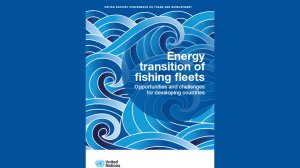Topic
Energy transition of fishing fleets: Opportunities and challenges for developing countries
23rd January 2024 The fisheries sector is important for food security, jobs and for the livelihoods of millions of people, especially in developing countries.... →
Africa needs a stronger voice on resolving the Red Sea crisis
By: ISS, Institute for Security Studies 23rd January 2024 The Red Sea crisis is now a United Nations Security Council (UNSC) priority, with three meetings held this year already. Following several months... →
Cash-strapped conservationists in South Africa are struggling to collect biodiversity data – how to change that
19th January 2024 South Africa’s government conservation organisations have experienced substantial budget cuts. Even after steps to cut costs, South African... →
Huge uplift for Eastern Cape on way from South Africa’s R105bn green ammonia project 
By: Martin Creamer 14th December 2023 The building of the R105-billion green ammonia project by Hive Hydrogen South Africa is poised to be a huge economic uplift for the Eastern Cape.... →
High Seas Treaty: Africa's role in saving the world's blue lungs
By: ISS, Institute for Security Studies 6th December 2023 The High Seas Treaty – officially known as the Biodiversity Beyond National Jurisdiction Treaty – must be signed and ratified by 20 September 2025.... →
City commences with aeration trial at Diep River
4th December 2023 As part of our ongoing public commitment to address the pollution of the Diep River and Milnerton Lagoon, and the consequent negative environmental... →
Open Letter to Minister Creecy Requesting Action Amidst Raw Sewage Discharge into Cape Town’s Sea
29th November 2023 Dear Minister Creecy, ActionSA has appealed against the issuing of permits that authorise the City of Cape Town to continue discharging untreated... →
Lack of funding could sink Africa’s ocean protection efforts
By: ISS, Institute for Security Studies 17th November 2023 Over 11-million tonnes of plastic are dumped into the world’s oceans annually, and 90% of its fish population has been fully exploited or... →















